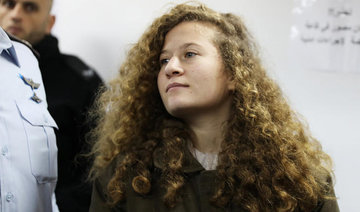JERUSALEM: The trial of Palestinian protest icon Ahed Tamimi before an Israeli military court has been postponed for a week and is now scheduled to begin on Feb. 13.
Tamimi, who turned 17 in prison last week, was charged with assault and incitement after she slapped and punched two Israeli soldiers in her West Bank village in December.
The incident was captured on video and widely shared online.
Ahed's supporters say it symbolizes the Palestinians' David vs. Goliath struggle against Israel's decades-long military occupation. Israel has portrayed her actions as a staged provocation meant to embarrass the army.
Defense lawyer Gaby Lasky said Sunday that the trial, which was set to begin Tuesday, was delayed because the prosecution was slow in sharing evidence.
The Israeli military confirmed the new starting date.
The military last week confirmed the date had been changed to Feb. 6, adding it was postponed at Lasky's request.
Both Ahed Tamimi and her mother have been ordered to be held in custody throughout their trial.
Ahed Tamimi's cousin Nour Tamimi, 20, has also been charged in connection with the case, but was freed on bail on January 5. Her next court appearance has been set for February 12, Lasky said.
The UN Office of the High Commissioner for Human Rights has criticised Israeli authorities' actions in the case, while the European Union has expressed concern over Israel's detention of minors, including Ahed Tamimi.
Ahed Tamimi has been hailed as a hero by Palestinians who see her as bravely standing up to Israel's occupation of the West Bank.
Israelis accuse her family of using her as a pawn in staged provocations.
She has been charged with 12 counts including assault and could face a lengthy jail term if convicted.
The charges relate to events in the video and five other incidents. They include stone-throwing, incitement and making threats.
Ahed Tamimi's family says the December 15 incident that led to the arrests occurred in the yard of their home in Nabi Saleh, near Ramallah in the West Bank.
Israel's military said the soldiers were in the area to prevent Palestinians from throwing stones at Israeli motorists.
A video shows the cousins approaching two soldiers and telling them to leave before shoving, kicking and slapping them.
Ahed Tamimi is the most aggressive of the two in the video.
The heavily armed soldiers do not respond to what appears to be an attempt to provoke rather than seriously harm them.
They then move backwards after Nariman Tamimi becomes involved.
The scuffle took place amid clashes and protests against US President Donald Trump's controversial recognition of Jerusalem as Israel's capital.
Relatives say that a member of the Tamimi family was wounded in the head by a rubber bullet fired during those protests.
Eighteen Palestinians have been killed since Trump's declaration on Dec. 6, most of them in clashes with Israeli forces. One Israeli has been shot dead since then.
Ahed Tamimi has been involved in a series of previous incidents, with older pictures of her confronting soldiers widely published.
She has become something of an icon for Palestinians who have flooded social media with praise and support.


Trial of Palestinian teen Ahed Tamimi postponed to Feb. 13
Trial of Palestinian teen Ahed Tamimi postponed to Feb. 13

UN nuclear agency holds special meeting on Iran
VIENNA: Delegates at the United Nations’ nuclear agency began meeting on Monday for an extraordinary session on Iran in the wake of the US-Israeli strikes on the Islamic republic.
Russia, a key ally of Tehran, requested the meeting on Saturday at the Vienna-based International Atomic Energy Agency (IAEA), following the same request by Iran.
The extraordinary meeting precedes an already scheduled regular session of the IAEA’s board of governors, which represents 35 countries.
Following the strikes, the IAEA — which monitors Iran’s nuclear program — said on Saturday that it was “closely monitoring developments in the Middle East, and urges restraint to avoid any nuclear safety risks to people in the region.”
Russia, a key ally of Tehran, requested the meeting on Saturday at the Vienna-based International Atomic Energy Agency (IAEA), following the same request by Iran.
The extraordinary meeting precedes an already scheduled regular session of the IAEA’s board of governors, which represents 35 countries.
Following the strikes, the IAEA — which monitors Iran’s nuclear program — said on Saturday that it was “closely monitoring developments in the Middle East, and urges restraint to avoid any nuclear safety risks to people in the region.”
© 2026 SAUDI RESEARCH & PUBLISHING COMPANY, All Rights Reserved And subject to Terms of Use Agreement.










